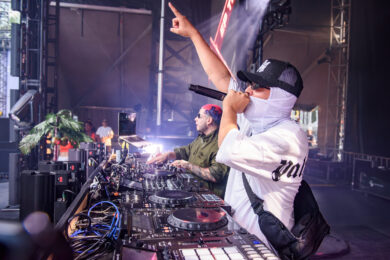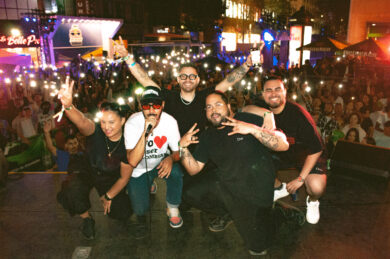Latin music has never been so vibrant in Montréal. Over the past five years, there’s been an explosion of Latin events and artists exploding on the scene.
The FLTK collective — short for Flowtiko, which stands for “flow exotique” — is the beating heart of this widespread genre of music in the city. Since its inception in 2022, this band of producers, artists, and DJs has attracted more than 21,000 people to its various events in Montréal, but also in Toronto, Ottawa, Sherbrooke, Halifax, Calgary, and even abroad. FLTK’s founder and DJ BVLA is thrilled by the ongoing transformation of the Latin scene. “When I started doing DJ sets many years ago, people would ask me not to play reggaeton because it wasn’t mainstream enough!” he says. “Nowadays, even bars are calling me to spin a whole evening of nothing but reggaeton…”

BVLA (photo: Myriam Frenette)
Far from being an industry newcomer, BVLA began his career alongside Myztiko, a Montréal-based Guatemalan producer, who made his mark during the 2000s as part of the Pina Records roster, a world-class imprint in the reggaeton world. After working with Daddy Yankee, and other big names in Latin music, Myztiko came back to Québec with a bitterness that he passed on to his sidekick. “The industry’s structure disgusted me, and led me astray from my passion,” BVLA says, in reference to the way he believes record labels tend to exploit artists. He gravitated back towards the industry when he saw that artists like Bad Bunny were able to make it independently.
The influence of Bad Bunny, one of the world’s most streamed artists, is considerable on the local scene. In December 2022, a second collective of various artists and DJs was created: Frikiton. The first event Frikiton organized was held at Ausgang Plaza and dubbed Una Navidad Sin Ti (Christmas Without You) and the whole concept was centred around the Puerto Rican rapper and singer. “That’s when we realized that there was a community for that type of event. That was the official launch of Frikiton, and it snowballed from there,” says Diego De La Torre, aka Santofuego. Along with various artists and entrepreneurs, such as DJ Nana Zen, he’s a co-founder of the non-profit organization Culture Urbaine Latine Orchestrée, which produces Frikiton events, and manages the careers of local artists such as Ed Winter, and Tr3ppy.
A Global Movement
Obviously, Bad Bunny isn’t the only inspiration for local artists looking to break out and unite. An entire movement of Latin music influences Montréal’s scene, and it has greatly evolved since the emergence of the king of reggaeton, Daddy Yankee, in the 2000s. Just over a decade later, Daddy Yankee did a collab with fellow Puerto Rican Luis Fonsi and Justin Bieber, producing a remix of “Despacito” that has become the go-to summer hit ever since. “’Despacito’ is when international pop artists became open-minded about Latin music. It was a watershed moment,” says Santofuego.
Bad Bunny’s following duets with Drake and Cardi B cemented that trend. From that point on, Latin music’s various genres were no longer relegated to their place of origin. Local talents now have models of success to look up to, beyond the aforementioned megastars, according to Ximena Holuigue — the founder of Montréal’s production and talent agency ISLAS. “It makes a big impression on emerging artists to watch the career of an artist like Colombian singer Feid. He was a professional songwriter for nearly a decade and then decided to become a performing artist. Young artists now have more idols with various career paths to look up to,” she says, also mentioning Karol G and Peso Pluma.
This renewed global ebullience of Latin music is reminiscent of the one that occurred at the turn of the millennium, when we collectively discovered Ricky Martin, Shakira, Jennifer Lopez, and Enrique Iglesias. Most of them, however, veered away from their sound at some point, which is not the case with artists in the current scene. This time around, Latin artists are influencing American pop, not the opposite, as Holuigue confirms. “J.Lo has often said that she had to fight to keep her Latin identity,” she says. “They were trying too hard to brand her and make her more American. But now, you can break that. We’re in a new era, with new types of structures that are more favourable to independent artists.”
Several Montréal-Specific Factors

Frikiton (courtesy Diego De La Torre)
There are several specific local factors explain this marked interest for Latin music. The main one is that immigration from Latin America has increased over the last few years. Between 2016 and 2021, more than 10,000 people from Latin America immigrated to Montréal, and that’s not counting seasonal workers and students. After Black and Arabic immigration, Latin Americans account for the largest proportion of immigrants in the metropolis, and in Québec as a whole. “And it’s hands down the most loyal community,” says Santofuego. “We can see it at our events. After the first Frikiton, we got hundreds of messages saying, ‘When’s the next one?’”
It seems obvious there was a gap that needed to be filled in Montréal’s nightlife. In the 2000s and 2010s, many promoters were inviting Latin music heavyweights to Montréal, but presented run-of-the-mill shows, with no attention to detail, and a ton of rushed local opening acts. “People were putting on a lot of events just for a cash grab, but there was no focus on the experience,” says Santofuego. “Meanwhile, the Afro scene developed super-fast, thanks to Club Sagacité (a non-profit supporting multi-disciplinary creative work) and events like Moonshine (co-founded by Pierre Kwenders). It set an example for us.”
Launched in the summer of 2021, the Joy Ride Latino label also contributed to the revitalization of Québec’s Latin scene. “They opened a door. Independent Latin artists finally had a point of reference [in Québec’s music industry],” says Santofuego, about the sub-label of acclaimed hip-hop imprint Joy Ride Records — which represents Cruzito, among others.
Finally, it’s impossible to talk about the effervescence of the local scene without mentioning the Fuego Fuego festival that takes place at Montréal’s Olympic Park on May 25-26, 2024. One of the reasons why festival’s founders decided to create this event in 2022 was the scale of events organized by the FLTK collective, which includes renowned producers such as Dayme Beats (J Balvin, Nicky Jam) and Demy & Clipz (Bad Bunny). “When [the founders] came to our events, they couldn’t believe our dynamism and energy. They wanted to transpose this no-downtime format to their festival,” says BVLA, who’ll be on stage with several other artists from the collective for this third edition of the festival.
The Frikiton gang will also be on hand, as will a host of other local artists including Isabella Lovestory, Mariana Gueza, Chika, PRIMO, Jace Carrillo, Pachy Flow, Cahnei, Greyz, Discoño, and DJ D-Bo. The invitation is symbolic for Santofuego. “When the festival was announced in 2022, we knew the timing was ideal for a project like Frikiton,” he says. “The time had come to join forces. It would’ve been unthinkable just five or 10 years ago to see local artists on stages as big as Fuego Fuego.”